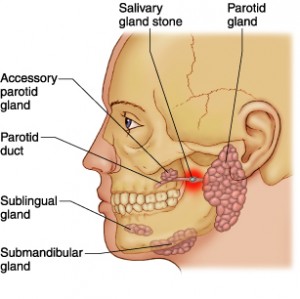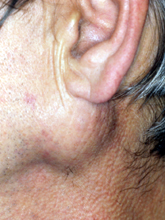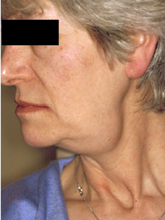Salivary glands are glands found in the mouth that makes saliva. The glands can be classified into two groups – major and minor salivary glands. Major salivary glands consist of three paired glands – the parotid, submandibular and sublingual glands while the minor ones are countless small glands located throughout the mouth. Saliva is essential for the normal functioning and health of the mouth.  Disorder of salivary glands function can lead to oral disease, for example tooth decay and gum disease.
The most common cause of a salivary gland lump is mumps, which usually affects children and typically causes painful swellings on both sides of the face. However there are many other causes of swelling in the salivary glands, for example salivary gland infection, salivary gland cancer, systemic diseases and drugs.
Salivary gland cancer is a rare malignant salivary gland tumor, accounting for about 2% of malignant tumor in the head and neck and mostly seen in older people. Although salivary gland cancer arises most frequently in the major glands, the number of malignant tumors is higher in minor glands.
Causes of salivary gland cancer
The exact cause for salivary gland cancer is unknown but the risk of getting salivary gland cancer increases with:
- Old age
- Following radiotherapy or radiation to the head and neck
- Exposure to cancerous substances in work
- Tobacco smoking
- Having a history of salivary gland cancer in the family
Signs and symptoms of salivary gland cancer
Salivary gland cancer may not cause any symptoms in the early stages. The main clinical feature of salivary gland cancer is swelling in the salivary gland region though it does not exactly indicate that you have cancer as most salivary gland tumors are benign.
Consult a doctor if you see the following symptoms:
- Rapid growth of a lump (usually painless) in the area of the ear, cheek, jaw, lip, or inside the mouth
- Fixation of the swelling to surrounding tissues
- Having troubles opening your mouth widely
- Persistent pain in the salivary gland area
- Numbness or weakness in the face
- Lymph nodes swellings on the face or neck
- If it is a parotid gland cancer, you may see a lump in front of the ear which can cause the lifting of the earlobe
Diagnosis of salivary gland cancer
Salivary gland cancer may be detected by your dentist or doctor and can be confirmed by:
- A detailed history and examination are essential. The head, neck, mouth, and throat will be checked for signs of disease.
- The diagnosis can only be firmly established by fine needle aspiration (FNA) biopsy whereby a thin needle is used to remove tissue or fluid from the tumor and put under the microscope to look for cancerous cells.
- Ultrasonography, a procedure in which high-energy sound waves (ultrasound) are bounced off internal tissues or organs and make echoes; is useful, non-invasive and readily available.
- Sialography may reveal a filling defect or gland displacement but is a relatively imprecise and non-specific
- Magnetic resonance imaging (MRI) uses radio waves  to make a series of detailed pictures of areas inside the body to see the extent of the tumor.
- Computerized tomography (CT) scan uses thin X-ray beams to make a series of detailed pictures of areas inside the body and functions similarly to MRI.
Prognosis of salivary gland cancer
Treatment options and chance of recovery depends on:
- Stage of the cancer – size, lymph node involvement and spread of cancer cells
- Type of cancer
- Patient’s age and general health
Management of salivary gland cancer

© ndc.com.sg
- Early detection carries a good prognosis.
- The treatment of choice is salivary gland surgery especially if the salivary gland cancer is of low grade, small and has not spread anywhere. The main complication of surgery is injury to the nerves as there are several important nerves surrounding the salivary glands. Nerve damage can affect the movement of the face. Some salivary gland cancers can invade bone and nerve tissues and a wide excision is required.
- Radiotherapy is sometimes used if the tumor is of high grade, has spread or cannot be removed by surgery. Radiation therapy destroys cancer cells using high-energy radiation and may cause some side effects, for example dry mouth, skin changes, sore throat, change in taste sensation or problem in swallowing.
- Reconstructive surgery may be needed if a large amount of bone or tissue is removed during surgery.
How to prevent salivary gland cancer

- Avoid or limit exposure to radiation
- Avoid tobacco smoking and other cancer-causing substances
- Do not ignore a persistent lump or swelling in the face, neck or mouth
- Have regular checkups at the dentist or doctor
When to contact a doctor
Consult a doctor if you spot any of the following symptoms:
- A lump or swelling in the face, neck or mouth
- Persistent pain in the salivary gland area
- Numbness or weakness in parts of the face



Pingback: Causes of Sore Gums | Intelligent Dental
Pingback: What is Sialadenitis? | Intelligent Dental
This is really great information. I have found that there is a lot of misinformation on the internet about health issues therefore I appreciate your great content. I find that regular activity, such as running, is good for your health and will help you keep fit. Personally I love starting my day with some simple yoga exercises. This will even help keep you fit in the bedroom. The only other issue you have to be aware of is your sexual health. Especially the HPV Virus seems to be up and coming but an infection can easily be avoided if you have informed yourself about this subject. What does anyone else think on this?